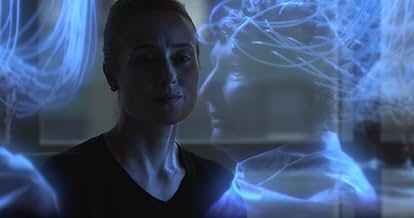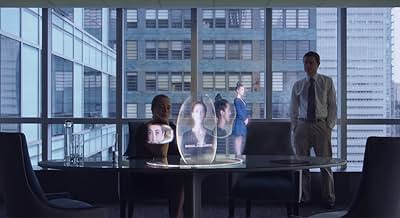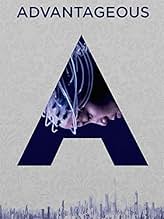En una ciudad del futuro cercano donde la creciente opulencia eclipsa las dificultades económicas, Gwen y su hija Jules hacen todo lo posible para aferrarse a su alegría juntas.En una ciudad del futuro cercano donde la creciente opulencia eclipsa las dificultades económicas, Gwen y su hija Jules hacen todo lo posible para aferrarse a su alegría juntas.En una ciudad del futuro cercano donde la creciente opulencia eclipsa las dificultades económicas, Gwen y su hija Jules hacen todo lo posible para aferrarse a su alegría juntas.
- Dirección
- Guionistas
- Elenco
- Premios
- 7 premios ganados y 3 nominaciones en total
- Spokesperson Candidate
- (as Rebecca Pitkin)
- Dirección
- Guionistas
- Todo el elenco y el equipo
- Producción, taquilla y más en IMDbPro
Opiniones destacadas
The first is the deceleration of time for background objects while objects in the foreground continue to move at a regular speed. This mixture of various speeds becomes a motif for understanding the futuristic world she presents to the audience.
The second technique is the compression of space achieved by using telephoto and zoom lenses. The human eye perceives depth of field in three dimensions. Objects farther away are small and objects closer to us are big. This is normally replicated with a dolly shot in films where the camera physically tracks forwards or backwards. However, in Advantageous, the zoom lens is used to compress the space in front of us. The camera stays still and we simply get closer to the subject. This causes a flattening of space to the point our eyes are no longer able to perceive the distance between the foreground objects and background objects.
The third technique Phang uses to create a believable science fiction world is silence. Yes I talk about silence a lot, but it does wonders. Our ears are not used to hearing complete and utter silence. In every moment, even at the quietest moments, we are subjected to some level of constant ambient noise. Whether it's coming from the Air Conditioner, the Fridge, the Wind, there's always something preventing us from experiencing complete silence. However, when we do finally get the chance and we see a character on a big screen screaming and crying in complete silence, our ears are hit with a new level of sensory experience. The new sensory experience is foreign to our ears and forces the audience to take the character he or she is watching out of his assumption of the character's world. This means, the audience finally recognizes that the character he or she is watching does not have the same sensory understanding of the world as he or she does.
These three techniques were vital in Phang's ability to successfully create a sophisticated and at the same time genuine science fiction world on a low-budget.
The premise is definitely interesting, and there were parts of the film that I really liked. However, the story continually came back to tedious metaphysical themes that bored me. In the end, I realized that the film was about the metaphysical themes, and this left me feeling a bit unfulfilled. I suppose it was even more so about cultural criticism, especially a feminist critique of how society treats female aging and beauty. But it kept coming back again and again to these questions of "why am I here", "what is my purpose", and "is there something insubstantial, such as love, that science can't replicate in a lab"?
Kim plays a woman who must make a life-changing choice. Unemployment is skyrocketing, men are pressuring women to leave the workforce, and older workers are seen as hopelessly out-of-touch with the modern market. In fact, humans themselves are being rapidly replaced, and the only way to secure any kind of hope for your child's future is for them to attend the most prestigious schools. The alternative seems to be child prostitution. Most of this is established in the background; if you don't pay close attention, you'll miss it. Unexplained explosions rock the sterility and eerie quiet of the world, and news reports hint at terrorist uprisings because of a hopeless, jobless populace.
So, when you lose your job, that basically means that you've lost everything. What if your employer offers to give you your job back if you'll let them control who you are? So, our protagonist becomes desperate to avoid forcing her own daughter to make these same kinds of desperate choices. What can she do but accept? The question becomes what price she has paid. As the film mulls this over, I began to lose interest. Normally, it takes very little for me to become heavily involved in a character's plight, but, in this case, I struggled. Maybe it's because I don't have kids. For a parent, maybe this would be a more harrowing tale.
There are many admirable aspects to this film, chief among them a woman-centric tale that feels genuine. In some science fiction films, the female protagonist seems to have been written as a male who then gets a gender-flip to mix things up. Or she's a sexual object for the viewers to ogle. There's nothing wrong with a bit of exploitative science fiction, but it's nice to see something with higher aspirations every once in a while. This certainly has that, but it goes so far as to seem pretentious at times.
Maybe this was simply too far outside of my demographic. On the surface, it's got a lot of themes and ideas that appeal to me, but the focus seems to be diametrically opposed to how I would have done it. Less metaphysics, more world-building. If you're interested in feminist science fiction, however, this is rare example. You should at least give it a chance if you're interested in such things. Perhaps you'll be more intrigued by the themes than I was.
As one reviewer described it, the deliberate choice of everything - from color, to music, to lighting was so well thought out, it was truly watching moving artwork.
And yes, I used the word film to describe this work rather than movie. The two have a definite distinction.
It wasn't until the very last scene that tied it all together for me and then it hit me like a ton of bricks that the whole movie was an elaborate setup of this clincher. And it's not what you think. I burst out in tears as the credits began to roll as I wondered at the brilliance I just witnessed. It was so unexpected. Anyway, I'm probably blowing it out of proportion, but I recommend watching this.
¿Sabías que…?
- TriviaWas first released as a 21 minute short, an episode on the PBS show "Futurestates" in 2012.
- Citas
Gwen 2.0: What's wrong?
Jules: I don't really know why I'm alive.
Gwen 2.0: Doesn't matter. Whatever you do will be wonderful and worthwhile.
Jules: How do you know?
Gwen 2.0: I know because you're kind.
Jules: People say being kind is being weak.
Gwen 2.0: You're alive because of energy, and empathy. Your mother had so much of it inside of her, she needed to get it out. So she made you.
Jules: You're starting to sound like her.
- ConexionesEdited from Futurestates: Advantageous (2012)
Selecciones populares
- How long is Advantageous?Con tecnología de Alexa
Detalles
- Tiempo de ejecución1 hora 30 minutos
- Color



























